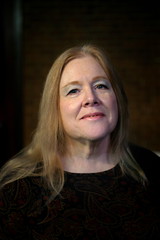On Self-direcing by Actors
a Theatre discussion...
I think that an acting ensemble with "interior" direction could be fine. Some musicians who play chamber music have a conductor, some don't. I have seen some good no-director plays -- I just can't remember where or when at the moment. OTOH-- I hardly ever remember the directors-- do you? It's only after seeing 4 or 5 productions of the same play that you begin to be able to sort out the difference a director makes.
I didn't say "an"actor-- rather actors. "An" would be like appointing the 1st violin to make all the decisions a conductor would. Interior means that the direction comes from inside the ensemble as a whole. I have worked this way myself, though not recently. In a 5 person ensemble, 1 or more of the actors give feedback on scenes in which they do not appear and can therefore see from the audience POV. In scenes in which everyone appears, actors take turns stepping out and either delivering their lines from out front or watching a stand in walk through reading for the character whose actor is out. The actors take notes, the group discusses the perceived problems and works together on ways to fix them. Ideas do not flow from the top down, but circulate. Another technique common to self-directed groups is role-passing. Actors switch roles in rehearsal to develop a group understanding of the actions and inter-realtionships.
The director is a very recent addition to the process. Some few troupes or theatres had directors as early as 150 years ago, but even as late as the 1920's most were organized differently, around either an actor-manager or a producer. For thousands of years, we've had actors, with or without playwrights. Actors passed on the traditional "business" that was customary in famous roles, like Hamlet or Lady M. Even when designers ruled and painted elaborate sets the actors stood in front of the decor and did what they were used to doing.... stars down stage center, supporters framing them, bit players "dressing the stage". The idea of a "director's interpretation" carried out by a cast chosen for their suitability to his vision appeared only the generation before mine. My grandparents generation would have been baffled by the idea. I'm writing about the famous actress Ellen Terry c. 1840-1910. Lots of attention to details of costume and manner, many different "bosses", usually the leading actor-- but hardly ever a director as such.
I think that an acting ensemble with "interior" direction could be fine. Some musicians who play chamber music have a conductor, some don't. I have seen some good no-director plays -- I just can't remember where or when at the moment. OTOH-- I hardly ever remember the directors-- do you? It's only after seeing 4 or 5 productions of the same play that you begin to be able to sort out the difference a director makes.
I didn't say "an"actor-- rather actors. "An" would be like appointing the 1st violin to make all the decisions a conductor would. Interior means that the direction comes from inside the ensemble as a whole. I have worked this way myself, though not recently. In a 5 person ensemble, 1 or more of the actors give feedback on scenes in which they do not appear and can therefore see from the audience POV. In scenes in which everyone appears, actors take turns stepping out and either delivering their lines from out front or watching a stand in walk through reading for the character whose actor is out. The actors take notes, the group discusses the perceived problems and works together on ways to fix them. Ideas do not flow from the top down, but circulate. Another technique common to self-directed groups is role-passing. Actors switch roles in rehearsal to develop a group understanding of the actions and inter-realtionships.
The director is a very recent addition to the process. Some few troupes or theatres had directors as early as 150 years ago, but even as late as the 1920's most were organized differently, around either an actor-manager or a producer. For thousands of years, we've had actors, with or without playwrights. Actors passed on the traditional "business" that was customary in famous roles, like Hamlet or Lady M. Even when designers ruled and painted elaborate sets the actors stood in front of the decor and did what they were used to doing.... stars down stage center, supporters framing them, bit players "dressing the stage". The idea of a "director's interpretation" carried out by a cast chosen for their suitability to his vision appeared only the generation before mine. My grandparents generation would have been baffled by the idea. I'm writing about the famous actress Ellen Terry c. 1840-1910. Lots of attention to details of costume and manner, many different "bosses", usually the leading actor-- but hardly ever a director as such.


0 Comments:
Post a Comment
<< Home